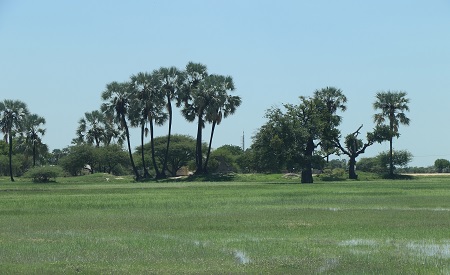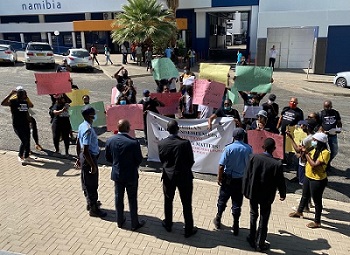By Shivute Kaapanda /
OUTAPI – The Ombalantu Traditional Authority will welcome and assist anybody seeking for any kind of information, except for requests seeking disclosure of traditional court proceedings.
Such is the position and point of view of the Ombalantu Traditional Authority on the Access to Information Act (Act 8 of 2022).
This was revealed by the spokesperson of Ombalantu Traditional Authority, Tatekulu Isdor Angula Kanelombe.
According to the Access to Information (ATI) Act, access to information, especially “public information,” is of utmost necessity to a functional democracy.
Thus, the Act says that a person has the right to access information held by public entities without delay and free of charge, “except where payment of reproduction, translation and transcription is allowed under this Act or any other law”.
The Act also states that a person has the right to “expeditiously and inexpensively access information of private entities that may assist in the exercise or protection of any fundamental human right or freedom.”
This Act therefore aims to create an environment and a society where there is transparency, accountability, good governance and easy access to any information that is held by public bodies and even private entities where such information is of public interest or may be useful for purposes of information dissemination through processes which lead to an informed and enlightened citizenry.
Thus ATI endeavours to create a society where access to information is as much a right as other rights which are enjoyed by citizens of a free society; this is the right of citizens to knock on the door of any public institution and seek for any information which is of interest to them.
Meanwhile, Ombalantu Traditional Authority (OTA) is an authority constituted by the traditional customs, values and laws of the Aambalantu people in the north-western part of Namibia. It is the administrative arm of the Chief of Aambalantu people.
Through the Authority’s administrative office in Outapi, Omusati Region, the Authority has kept the flame of customary laws and practices alive albeit with significant influences by statutory laws of modern Namibia and other common law practices and imported cultures of the modern Namibian society.
While the Access to Information Act has been passed by the Parliament of Namibia and signed by the President, and already published in the Government Gazette on 28 December 2022, senior headman and spokesperson of Ombalantu Traditional Authority, Tatekulu Isdor Angula Kanelombe, said that the Ombalantu Traditional Authority is not aware of the Access to Information Act, and as such they have not received information of such law at their office.
Kanelombe was responding to queries from Omutumwa as to what effect the Access to Information Act is likely to have on the operations and activities of the Ombalantu Traditional Authority.
As to whether the office of Ombalantu Traditional Authority is open to freely give out information as according to the provisions of the “information access act”, he said the Authority’s office will be more than pleased to give out public information to the public except information that has to do with the traditional court proceedings which according to him are deemed “private”.
“Ombalantu Traditional Authority has an open door policy; we welcome every Namibian citizen be it a journalist, researcher or any person seeking public information,” Kanelombe said. “We operate under a democratic country, therefore such law is good for democracy, once promulgated we will welcome it with both hands.”
Omutumwa also spoke to Mr. Moses Fourman David, the Vice-Chairman of Ohamautwi District of the Ombalantu Traditional Authority, who confirmed that the office of OTA is not aware and they have not received such a law yet since according to him it is yet to be enacted.
“At the office of the OTA we are not yet aware, nor have received this law but we will welcome any piece of legislation enacted by the Namibian Parliament,” Mr David stated as he perused through a copy of the ATI Act shown to him by Omutumwa.
David pointed out that Ombalantu Traditional Authority is one of the traditional authorities in Namibia which are open and accessible to the media, and which respect the statutory laws of Namibia.
But with no knowledge so far of the existence of the Access to Information Act, David said that it is thus difficult to speak more in detail about the possible implications and influences this law may likely get to have on the operations and activities of the Ombalantu Traditional Authority.
As the Ombalantu Traditional Authority says it will not give any access to any information concerned with its traditional court proceedings, indeed the Access to Information Act also states that “this Act does not apply to […] information relating to proceedings and decisions of Cabinet and its committees; judicial functions of a court, a tribunal or investigating unit established under any law; and the nomination, selection and appointment of a judicial officer or any other person exercising a judicial or quasi-judicial function in terms of any law.”

In the photos: Communal land disputes is one of the most prominent matters commonly handled by the Ombalantu Traditional Court, especially where communal land has been sold to wealthy individuals or to private developers; likewise matters concerning inheritance for widows – issues for which disclosure of information may assist those affected (images for illustration purposes, courtesy of Ombalantu Traditional Authority & Ombalanhu United Clans).

[NB. This article was produced with the financial support of the Namibia Media Trust, through the New Voices, New Narratives in Public Policy Discourse project. Its contents are the sole responsibility of Omutumwa and do not necessarily reflect the views of the NMT nor any of its partners.]







